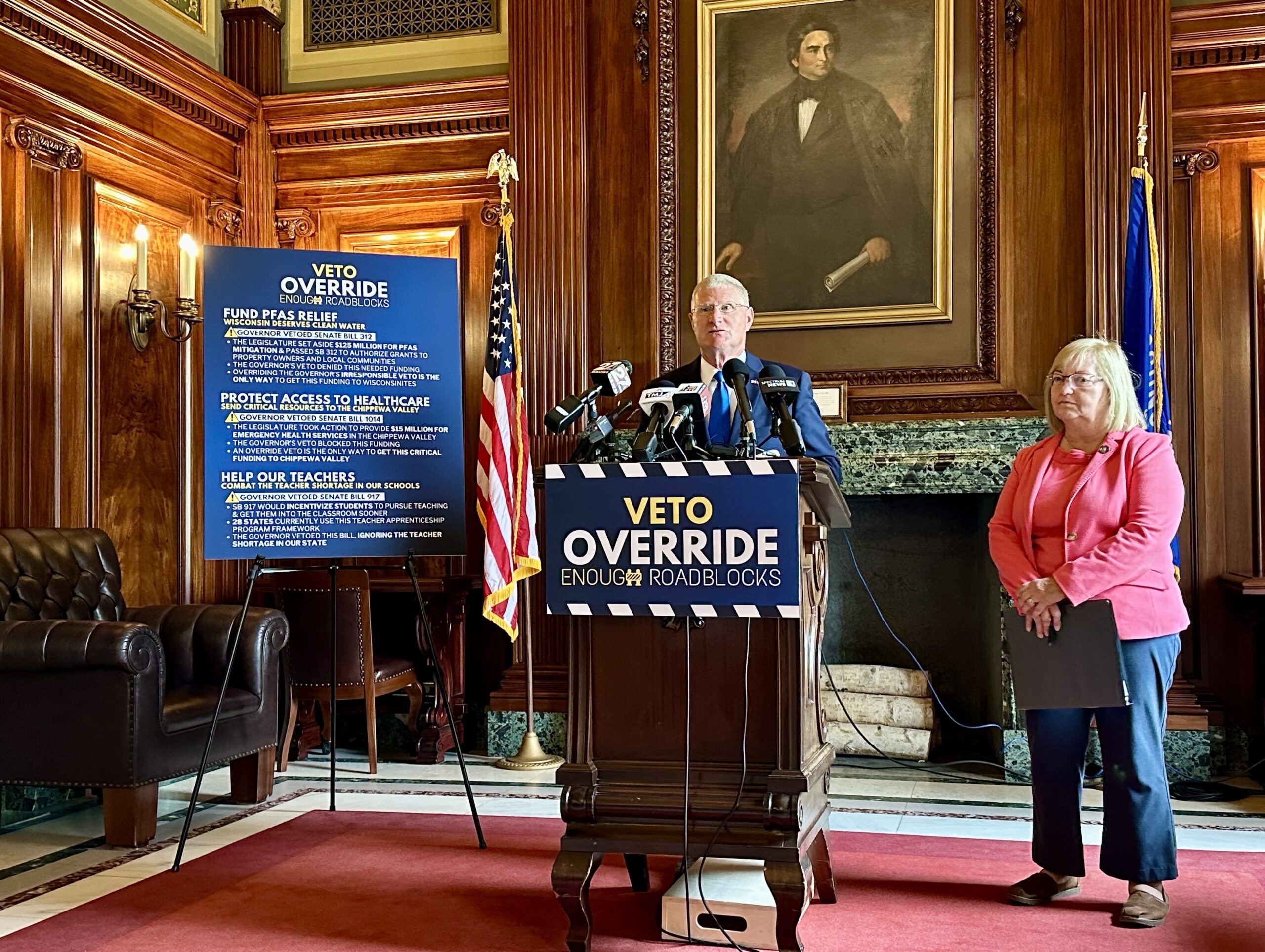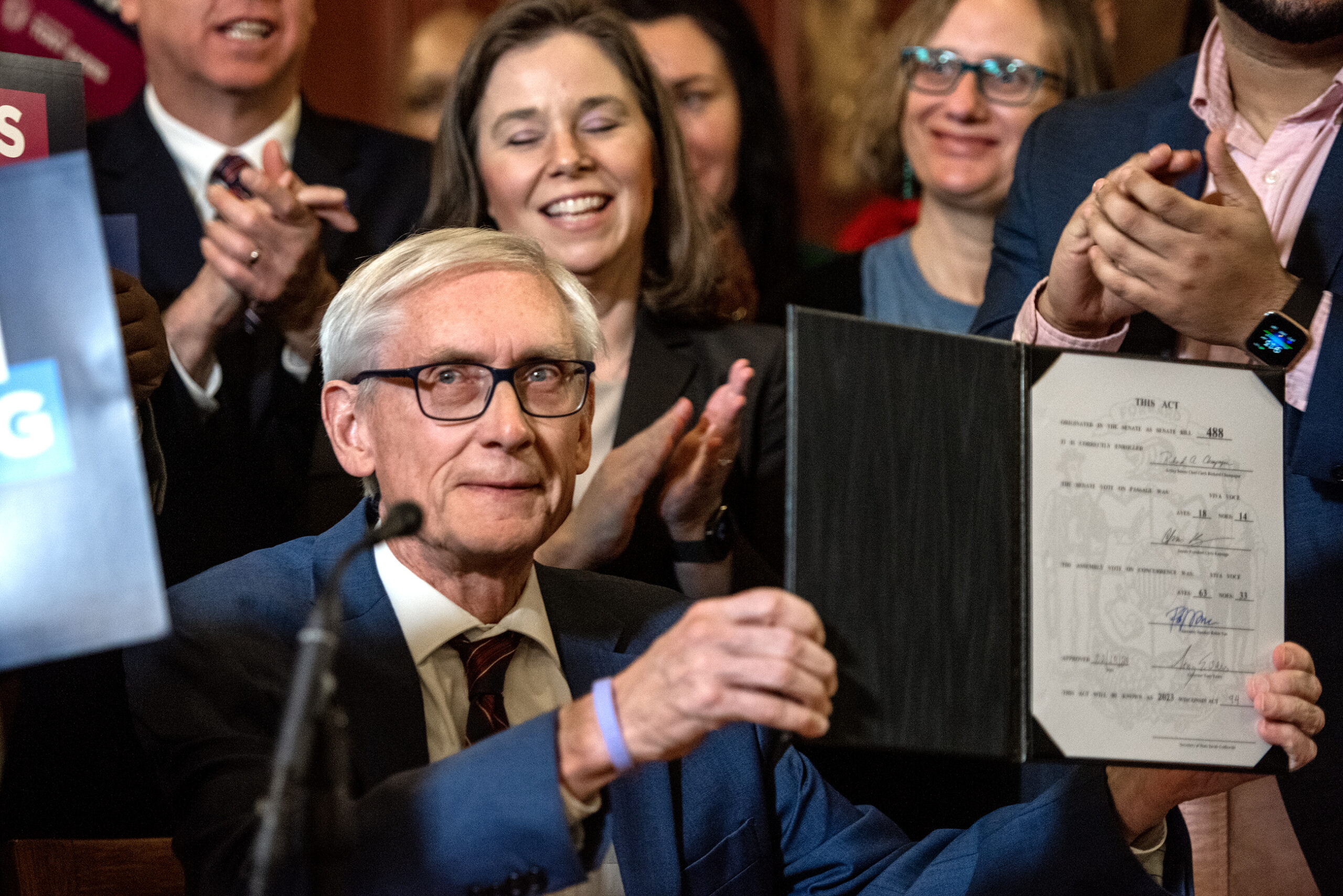Republicans in the Wisconsin Senate say they’ll convene Tuesday to potentially override dozens of Gov. Tony Evers’ vetoes, including his rejection of a PFAS funding bill that has been the source of ongoing battles between the parties.
At the same time, Evers announced he’d taken the Legislature to court over funding for a literacy program, the latest example of the two sides fighting over the details of how money gets spent in state government.
Republicans, who hold a two-thirds majority in the Senate that makes veto overrides of the Democratic governor possible, could potentially take up about three-dozen overrides Tuesday. At a press conference announcing the Senate’s plans Monday, Sen. Howard Marklein, R-Spring Green, pointed to two bills in particular that Evers had killed.
News with a little more humanity
WPR’s “Wisconsin Today” newsletter keeps you connected to the state you love without feeling overwhelmed. No paywall. No agenda. No corporate filter.
One detailed how to spend $125 million set aside in the state budget for addressing PFAS contamination, and the other funded hospitals in western Wisconsin.
“This is our chance to get this money out the door. It’s not our goal to have this money sitting here in Madison,” Marklein said.
The PFAS bill has been subject to months of back-and-forth between Evers and Republicans. Evers vetoed the bill in April after saying for months it was unacceptable because it undermined DNR’s regulatory authority.
Republicans argue Evers’ veto is stopping communities affected by the so-called “forever chemicals” from getting the relief they need. Evers says Republicans are to blame because they won’t remove what his office has described as provisions that protect polluters and force taxpayers to pay for clean-up.
Democrats say Republicans on the Legislature’s budget committee can still authorize the money to be released, although when Evers tried to force a vote on the funding last month, lawmakers rejected it.
Likewise, Evers used his partial veto on a bill that would spend $15 million for healthcare access in western Wisconsin after multiple hospital closures, arguing that it was overly narrow and did not cover enough medical services. Evers’ partial veto opened the door to spending the funding on a wider variety of expenses.
Also on the Senate’s agenda are prospective overrides of vetoed bills about wolf hunting, student teaching requirements, and work permits for minors.
While Senate Republicans could override the vetoes with help from Democrats, it’s unclear whether the Assembly will take up the same effort. Veto overrides require two-thirds votes by both chambers, and Assembly Republicans are two votes short of that threshold. Assembly Speaker Robin Vos, R-Rochester, has not indicated whether he’ll bring his caucus back.
Marklein said Monday that Tuesday’s override session in the Senate was likely Republicans’ last effort to change those legislative outcomes.
“I think the override of the vetoes is the end of the line here for these bills,” he said. “I don’t see any other pathway, unfortunately.”
Moments after GOP lawmakers unveiled their override plans, Evers also took his own action over a funding impasse, announcing he’d filed a counterclaim against Republicans who sued him in Dane County Circuit Court last month.
He’s asking the judge in that case to release $50 million for a literacy program. Republicans previously argued that Evers had improperly used his partial veto pen on the particulars of that bill. Evers’ lawyers are arguing their unwillingness to release the funding amounts to an improper use of the legislative branch, violating separation of powers.
In a statement, Evers tied together the literacy funding with the very bills that Republicans blamed him for holding up.
“Our response to challenges facing Wisconsin like water contamination, improving our kids’ reading outcomes, and responding to hospital closures in rural communities is being held up by Republican lawmakers who continue to obstruct the basic functions of government in this state,” he said. “Some of this funding has been sitting in Madison for over 300 days waiting for Republicans to take action—that’s ridiculous, there’s no excuse for it.”
Evers previously said he’s considering suing over the PFAS funding.
Wisconsin Public Radio, © Copyright 2025, Board of Regents of the University of Wisconsin System and Wisconsin Educational Communications Board.







